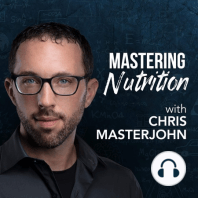27 min listen

Is it ok to mix carbs and fat? | Masterjohn Q&A Files #40
Is it ok to mix carbs and fat? | Masterjohn Q&A Files #40
ratings:
Length:
7 minutes
Released:
Jan 7, 2020
Format:
Podcast episode
Description
Question: Is it ok to mix carbs and fat? There are a lot of people on the internet that claim the Randle cycle is behind America being fat, since the standard American diet is mixed in fats and carbs. Yet, I feel great on a diet of about 30% protein, 30% fat, and 40% carbs, based on meat, potatoes, fruits, and vegetables. The randle cycle addresses why you would have elevated fatty acids or hyperglycemia and hyperinsulinemia due to competition. You're more likely to have circulating energy supplies in your blood due to poor tissue uptake when you're consuming carbs and fats together, and you're more likely to be more dependent on a higher insulin response. This doesn't mean that mixing them causes diabetes, it just means that there is more substrate competition and that, all else equal, if someone is on the edge of diabetes eating a mixed diet increases the probability that they're going to go over that edge because of the substrate competition contributing to hyperglycemia and the greater insulin requirement than someone who's on a low-carb or low-fat diet. If you have no evidence of metabolic dysfunction on a mixed diet, then there's no issue. Most Americans are fat because of caloric balance. Thinking that the glycemic or insulin response to eating plays a role in body fat gain is the same erroneous thinking that Taubes makes. There’s an element of truth in Taube’s carb-centric model, in that some people are going to eat more food in response to a high-carb diet if they have blood sugar problems. But that isn’t the norm. To say that the Randle cycle is the cause of obesity is making the same mistake because it’s focusing on the glycemic and insulin responses to eating instead of overall energy balance. What makes you fat is eating too much food. The only thing that you should change about the calories in calories out (CICO) hypothesis, on a practical level, is to say that it tells you very little about the behavioral modifications that someone needs to make to sustain the caloric deficit over time. So, why do people get fat? I largely endorse Stephan Guyenet's view: it's basically the proliferation of hyperpalatable food. A mixed diet leverages the principle of creating a hyperpalatable diet by mixing carbs and fat, but your diet doesn't sound hyperpalatable. This Q&A can also be found as part of a much longer episode, here: https://chrismasterjohnphd.com/podcast/2019/02/24/ask-anything-nutrition-feb-17-2019/ If you would like to be part of the next live Ask Me Anything About Nutrition, sign up for the CMJ Masterpass, which includes access to these live Zoom sessions, premium features on all my content, and hundreds of dollars of exclusive discounts. You can sign up with a 10% lifetime discount here: https://chrismasterjohnphd.com/q&a
Released:
Jan 7, 2020
Format:
Podcast episode
Titles in the series (100)
003: The Sugar Conspiracy -- Trading One Nutritional Boogeyman for Another: In his April 7, 2016 piece in The Guardian, "The Sugar Conspiracy" Ian Leslie argues that the politics of nutrition has blinded us to the fact that sugar is more deserving than saturated fat of the status of dietary arch-villain and that the... by Mastering Nutrition